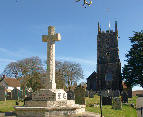According to records of admissions kept at Winkleigh School at the turn of the century, William Richard Baker was born on 16th April 1898, the fifth child of Richard Baker who was a road contractor and agricultural labourer who had been born in Dowland. In spite of being a large family, there were only two sons, William and a younger brother Frederick, born in 1902, who was thus too young to have been involved in the war. The school records show that William had left school on 3rd April 1912, aged 14 and a little over-age, having been kept there as long as possible by a father who obviously valued the school and its reputation. William was obviously anxious to follow in his father’s footsteps and enlist as soon as possible in the Territorial Army, and of course he chose his father’s old battalion, the 4th Devons whose headquarters was based in Devon’s Regimental Depot in Exeter.
William’s military records have unhappily not survived the London blitz that destroyed some 65% or more of the individual documents of the Great War, but his medal card gives us very useful information regarding his war service. The card confirms that this record was issued in India. The two regimental numbers are also significant. The first, 1985, issued on enlistment, shows that in spite of his age in 1914 still only just 16 and too young for overseas service, he had enlisted in the 4th Devons. We do not know whether this was the 1st/4th, or the second line battalion, the 2nd/4th which was formed in the September in Exeter. According to the battalion in which he had been placed, he sailed for India either on 11th November or 12th December 1914 as part of the 1st or the 2nd Devon and Cornwall brigade, 9th Indian Division, based at either Lahore or at Secunderabad. There were guard and garrison duties to undertake, plus guarding Turkish prisoners of war who would have begun to arrive during 1915 after war with Turkey had broken out in November 1914. Following their India experience, the 1st/4th Battalion were transferred from India to Mesopotamia in March 1916, landing at Basra on 2nd, while the 2nd/4th remained in India as the first line of reserves for reinforcements.
William’s second number, 200402, also confirms his service with the 4th Devons. On the card his army number is prefaced with the letters TFM, meaning ‘Territorial Force’ serving in Mesopotamia. Men who had enlisted (or who had already enlisted pre-war) directly into a Territorial unit, and were therefore not subject to the Military Service Acts (conscription) of 1916 were given new army numbers on 1st March 1917, by an Army Council Instruction published on 23rd December 1916. Each corps of Infantry was allocated a block of numbers starting at 200001. The allocation for each infantry corps was then broken into smaller blocks for each battalion. Those men who had enlisted in a Territorial Army 4th Battalion, for example the 4th Battalion of the Devons (the senior Territorial Battalion in the Devonshire Regiment), were allocated numbers 200001 to 240000, those of the 5th Devons 240001 to 265000, and so on. From William’s number 200402 we can therefore be sure that he was indeed in the 4th Devons. In the wave of patriotism that swept the country in 1914, many Winkleigh men preferred to enlist in the Territorials, which were already known to them and contained many of their friends, rather than respond to the appeal of Lord Kitchener, Minister for War, whose famous poster urged them to join the first hundred thousand of the ‘New Army’. Another factor in their decisions was that nationally the Territorial Force was intended to be used for home defence only, and men were not to be sent overseas. Parents and employers could therefore be assured in these first days of a war that most thought would be over by Christmas that apart from the risk of invasion the survival of these young men would be certain. William, of course, was following his father’s old battalion.
Still too young for front-line service when the 1st/4th were posted to Mesopotamia in March 1916, (normally 19 years old for action at the start of the war), William would probably have been transferred to the 2nd/4th which remained in India until it left for Egypt on 15th October 1917, landing at Suez on 26th October, where the battalion was attached to the 76th Division and employed on Lines of Communication duties. The 2nd/4th was disbanded on 17th August 1918, the remnants presumably posted to the 1st/4th in Mesopotamia, who were now based in Amara as part of the Tigris lines of Communication force. It is possible, of course, that William had reached Mesopotamia even earlier, as soon as he was 19 years old on 16th April 1917. The Devons’ involvement in the attempts to relieve Kut in 1916 were well and truly behind them, so that apart from the dreadful climate and unpleasantness of campaigning in Mesopotamia, he would not have been in much danger, except of course from the ever prevalent sickness that caused so many casualties. The Mesopotamia force came under direct control from India, which would account for the fact that William’s medal card was issued there.
It is to be hoped, perhaps, that descendents or friends of the Baker family might be able to contact the site with further information on how William and his siblings progressed after the war, and if William married where his descendents are living today.
17 November 2012


